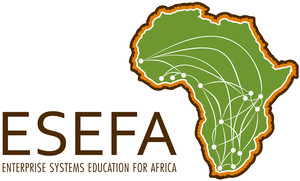The ESEFA Programme
ENTERPRISE SYSTEMS EDUCATION FOR AFRICA
In response to the global dynamics and trends in the ICT sector not leaving untouched the social and economic structures in sub-Saharan Africa, the ESEFA (Enterprise Systems Education For Africa) initiative was launched. The overall objective of the cooperation between the Otto von Guericke University Magdeburg (OVGU), the SAP University Alliances programme (SAP UA) and the University of Cape Town (UCT) is to actively shape and promote a sustainable ERP education at higher education institutions in sub-Saharan Africa. A professional technology aided ERP teaching and learning platform, hosted by the SAP University Competence Centre (UCC) at the OVGU, guarantees a long-term provision of the educational software. By taking into account the social and regional circumstances prevailing at universities in sub-Saharan Africa, ESEFA plays a pioneering role in facing the challenge of a sustainable ERP education.
PARTNER
ERP market leader SAP SE with its University Alliances programme and the German Investment and Development Corporation (DEG) as a subsidiary of the government-owned development bank KfW. The University of Cape Town, now assuming the role as ESEFA/Academic Competence Centre (ACC), was brought on board as a local project partner from the very beginning being responsible for long-term programme operation on-site as well as curriculum development and support beyond the project period.
For further information on the ESEFA programme managed by the ESEFA Centre at the University of Cape Town, please visit: www.esefa.ac.za
PROJECT TERM
March 2012 - September 2016
PROJECT RESULTS AT A GLANCE
Establishment of an African university community
More than ten universities in different countries joined the programme forming a strong academic network that enables joint research work and a bundling of knowledge, on the basis of which ERP education can be provided across the sub-Saharan region.
Ground-breaking cooperation with Zambikes
With Zambikes, a Zambian bicycle manufacturer crafting customised bicycles using locally grown bamboo, ESEFA gained an important partner that serves as a real-life model company for the utilized case studies and exercises illustrating the various business processes in a bicycle company. Based on this, a customised curriculum has been developed being responsive to the teaching and learning needs of lecturers and students at universities in sub-Saharan Africa.
Development of a modular curriculum featuring multiple course scenarios
The course design features a modern blended-learning scenario combining lectures and workshops to encourage self-directed learning. To meet the needs and aspirations of students, the modular ERP course can be provided either as a 5-day short course or as an integrated course allowing multiple course scenarios for various disciplines. Train-the-trainer courses offered by the UCT with associated certification by SAP UA will assist lecturers in gaining the necessary knowledge and skills required to teach enterprise systems in curricula.
Transition of the project towards a sustainable programme
To ensure a long-lasting programme operation beyond the project period the SAP African Academic Board was set up being responsible for the coordination of a cohesive academic network bundling the expertise of SAP SE, SAP UA and the ESEFA partner universities. The overall objective is to bringing together African academic institutions acting as thought leaders at the interface between academia and industry.
WHAT'S NEXT?
After four years of project duration and through joint efforts, ESEFA has evolved into a sustainable educational programme. By means of regional field studies and common research activities, ESEFA fosters a continuous development of existing and new competencies in the field of ERP education. The UCT as an ESEFA/ACC Centre ensures an ongoing programme operation and administration as well as access for lecturers, students and other partnering universities.
GET INVOLVED
The UCT invites universities throughout Africa to join the ESEFA programme and become part of the cross-regional academic network.
If you are interested in further information or want to join the ESEFA programme please visit the ESEFA portal: http://www.esefa.ac.za







